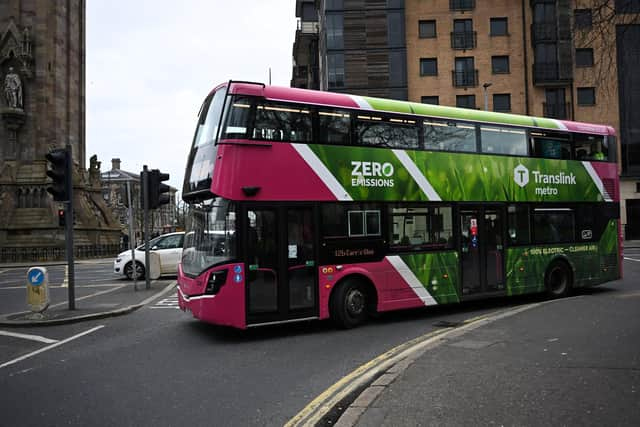Zero-emission buses announced for UK: These councils in Sussex and Surrey to receive millions in government funding
and live on Freeview channel 276
The Department for Transport said £10,100,000 ’conditional’ funding has been allocated to West Sussex County Council.
Brighton and Hove City Council will receive £2,900,000 and Surrey County Council will get £3,200,000. Across England, £142,800,000 will be put towards 955 zero-emission buses
Advertisement
Hide AdAdvertisement
Hide AdA DfT spokesperson said: “Transport Secretary Mark Harper has confirmed that 179 zero-emission buses will hit the road in the South East as six local councils receive £30.2 million to decarbonise their bus fleet.


"From Essex to the Isle of Wight, from Surrey to Reading, the new investment will help make local buses across the South East more modern, cleaner and more reliable, improving the local journeys that so many people rely on.
"The funding is part of the £143 million investment from the Zero Emission Bus Regional Areas (ZEBRA) programme, which will see new electric buses across towns, villages and cities across England, many of which will get zero-emission buses for the first time.”
Thanks to the ZEBRA scheme, no other European country registered as many electric buses in 2023 as the UK, with zero-emission buses accounting for almost half of all new large buses introduced last year, according to the Society of Motor Manufacturers and Traders (SMMT).
Advertisement
Hide AdAdvertisement
Hide AdSix councils in the South East will receive funding to give residents ‘cleaner, more modern and more reliable’ bus fleets, the DfT said.
It is part of the UK Government’s plan to improve local transport in the South East, ‘growing the local economy and delivering a brighter future for all’.
The funding comes on top of the £246 million that was delivered to improve bus services in the South East from the Department’s Bus Service Improvement Plan.
It is also in addition to more than £3.5 billion the government has been investing since 2020 to ‘protect and improve’ bus services in England while extending the £2 bus fare all the way to December 31, 2024, made possible by reallocated HS2 funding.
Advertisement
Hide AdAdvertisement
Hide AdTransport secretary Mark Harper said: “As part of our plan to improve local transport across the South East, we’re providing over £30 million to roll out 179 brand new zero-emission buses across the region.
“This latest investment into our bus fleet comes on top of the £3.5 billion we have invested into our bus network since 2020, protecting and improving bus routes into 2025 as well as extending the £2 bus fare cap until the end of 2024, made possible by reallocated HS2 funding.”
To make sure more parts of the country benefit from better buses and green technology – ‘particularly remote areas where building the infrastructure needed for the buses can be more expensive’ – the government has prioritised the first £40 million for rural communities.
These state-of-the-art buses will also improve the passenger experience, providing users with ‘considerably quieter and more comfortable journeys.
Advertisement
Hide AdAdvertisement
Hide AdThe new zero-emission buses will also ‘drive on smoother roads’ thanks to £8.3 billion to resurface over 5,000 miles of roads in England over the next decade, the ‘biggest ever funding uplift’ to improve local roads – ‘all thanks to reallocated HS2 funding’.
Alison Edwards, director of policy and external relations at the Confederation of Passenger Transport, said: “CPT welcomes this support from Government to help accelerate vital public and private investment in new zero emissions vehicles and charging infrastructure.
"The transition to a zero emissions bus fleet is a huge opportunity for Britain to lead the world in creating a modern zero emission bus network that offers a growing number of passengers one of the most sustainable forms of transport.”
The government said the zero-emission buses will also be ‘more modern and replace older diesel buses’.
Advertisement
Hide AdAdvertisement
Hide AdThey will also meet enhanced accessibility standards, and will come with the latest passenger experience features such as Wi-Fi and USB charging sockets.
Janette Bell, managing director for First Bus, said: “Today marks a significant milestone as we invest further in our journey towards a zero-emission bus fleet across our UK operations.
"We’re delighted that customers will benefit from government co-funding of these transformative projects. We’ve worked tirelessly alongside our Local Authority partners to get to this point and cannot wait to get these vehicles out into service for our customers.
“It is an exciting time for our colleagues at all of these sites as we start to transform and futureproof the depots. This is also great news for our customers, who will see the immediate benefits of these state-of-the-art vehicles – including improved air quality and enhanced customer experience.
Advertisement
Hide AdAdvertisement
Hide Ad“As leaders in sustainable mobility, we’ll continue to work closely with central and local Government across the UK to support the delivery of our national decarbonisation commitments in our relentless pursuit to create a nation who loves and uses the bus.”